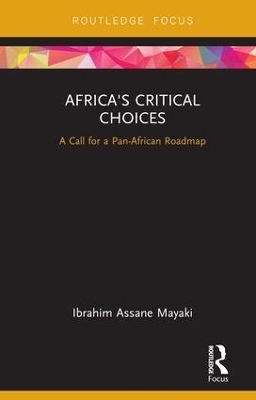
Africa's Critical Choices
Routledge (Verlag)
978-0-367-15051-8 (ISBN)
Dr Ibrahim Assane Mayaki is the Chief Executive Officer of the Secretariat of the New Partnership for Africa’s Development (NEPAD). Born in Niger in 1951, he obtained a Master’s Degree from the National School of Public Administration (Enap), Québec, Canada and a PhD in Administrative Sciences from University of Paris I, France. He first worked as professor of Public Administration and Management in Niger and Venezuela during the periods 1978-82 and 1985-87. From 2000 to 2004, Dr Mayaki was a guest Professor at the University of Paris XI, where he lectured on international relations and organizations; he also led research at the Research Centre on Europe and the Contemporary World within that University. His political career started in 1997, when, under the presidency of Ibrahim Bare Mainassara, he joined the cabinet of Niger as Minister in charge for African Integration and Co-operation, before holding the position of Foreign Minister. He was appointed Prime Minister of the country in November 1997. He remained in charge until January 2000. As Prime Minister of Niger, Ibrahim Assane Mayaki played a catalyst role in enhancing the social dialogue in the country. He initiated the creation of relevant technical committees in charge of the negotiations with social partners. He also created the Public Policy Analysis Circle (Cercle d’analyse des politiques publiques), a think tank focusing on health and education policy. He was appointed as NEPAD’s Chief Executive Officer in January 2009.
Table of contents
Preface 3
Introduction 7
Africa and globalisation 7
A slowdown ripe for reforms 8
Ten decisive years 8
Using our resources 9
The institutional key 9
The challenges
1. The spectre of recolonisation 13
Unfair control of capital? 15
Africans have the power 17
Civil society has to choose its battles well 19
2. Migration and trade: Africa has the choice of its tools 21
Time for understanding and action 21
Changes in migration 23
Asymmetrical exchanges
and unfair competition 26
A wider diversification of partners
is urgently needed 27
3. The threat of competing Africas 31
Rupture begets rupture 33
The frantic race for first place 34
The virtues of diversity 36
4. African states faced with climate change 39
Distress signals are coming
from all over Africa 40
Adaptation offers an opportunity, butÉ 41
The mobilisation of technical and financial resources is indispensable 42
Restoring lands, a key to the re--establishment of communities 44
Halting climate--induced migration 46
A singular voice for Africa 47
5. Unique and uncontrolled demographics 49
Demographic growth is predictable and manageable 50
Prevention: the keys to success 51
The demographic dividend and the green revolution 53
Agricultural corridors: from the informal to the creation of shared wealth 54
6. African youth, between tradition
and modernity 57
The digital multiplier effect 58
Tradition’s paradoxical compensatory effect 61
The keys
7. Reclaiming our intellectual sovereignty 65
A great disruption 66
Foreign investment
and why we must be vigilant 67
Basic education, universities and research 67
Prioritise and measure the effectiveness of education 69
Cultural heritage, the pillar of our intellectual sovereignty 70
8. What pan--Africanism means 73
The path to collective emancipation 74
Integration, an ambitious political innovation 75
9. The regional perspective as a solution
to national challenges 79
Security problems do not respect borders 80
The fragmentation of skills 82
10. Towards the co--production of public policy 85
On the subject of legislative systems 86
Citizen engagement and the question of appropriation 89
11. The informal sector, new technologies and industrialisation 93
Informality is a way of lifeÉ 94
É that remains brutal and dysfunctional 95
Towards a well--thought--out and smooth
transition to the formal sector 96
New technologies: tools for employment,
access to credit and taxation 98
What can governments do to accelerate this transition? 99
Information and communications technologies cannot do everything, but they can promote industrialisation 101
12. Ruralisation of cities or urbanisation
of the countryside? 105
The continent’s urbanisation 105
African modalities of urbanisation 106
Rethinking the relationship
between cities and rural areas 108
Spillover effects 109
The Òcall of the cityÓ is also the call of the countryside 110
13. The African farmer, an entrepreneur like any other 113
The obstacle of an outdated clichŽ 114
How to create agricultural employment 115
Alternative financing sources 117
The protection of farmers’ rights should be at the heart of future policies 118
Epilogue 121
Notes 125
Glossary 137
Index of names 139
General index 141
About the author 151
| Erscheinungsdatum | 15.03.2019 |
|---|---|
| Reihe/Serie | Europa Regional Perspectives |
| Verlagsort | London |
| Sprache | englisch |
| Maße | 138 x 216 mm |
| Gewicht | 249 g |
| Themenwelt | Sozialwissenschaften ► Politik / Verwaltung |
| Sozialwissenschaften ► Soziologie ► Makrosoziologie | |
| Sozialwissenschaften ► Soziologie ► Spezielle Soziologien | |
| ISBN-10 | 0-367-15051-4 / 0367150514 |
| ISBN-13 | 978-0-367-15051-8 / 9780367150518 |
| Zustand | Neuware |
| Informationen gemäß Produktsicherheitsverordnung (GPSR) | |
| Haben Sie eine Frage zum Produkt? |
aus dem Bereich


